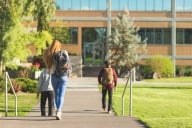You have /5 articles left.
Sign up for a free account or log in.
If all had gone according to plan, Bowdoin College students and their Brunswick, Me., neighbors would have received free wireless Internet access in town coffee shops and restaurants this fall. Instead, only students will be able to access the network covering the downtown area.
The plan, worked out between Bowdoin and a regional Internet provider, was nixed -- temporarily, at least -- by the college because of concerns over the Communications Assistance for Law Enforcement Act, which is designed to enable law enforcement officials to access phone lines whenever they need to tap them. Mitch Davis, chief information officer at Bowdoin, said he decided to suspend the plan until he gets a full explanation of how opening the network to the public would affect its standing under the federal law, known as CALEA.
“A clear definition of how CALEA is going to affect the college isn’t available,” Davis said. “We’re taking the cautious path to postpone the project, not kill it.”
Colleges across the country expressed marked concerned when the Federal Communications Commission issued regulations last year to apply the law to Internet networks, with no exemption for colleges. The American Council on Education filed a lawsuit against the FCC over the regulations, and a federal appeals court rejected the suit, saying that the rules could be enforced. The appeals court ruling made an exception for what it deemed “private networks.” So after significant legal wrangling and lobbying, and a analysis of the situation by the ACE, many higher education experts are now convinced colleges will be able to protect themselves from increased government monitoring -- as long as they keep their networks to themselves.
The main test of whether a network is considered private is if there are limits on who can use the system. The ACE has advised that colleges that restrict access to students, employees and alumni should be spared, while those that make computer terminals and networks open to the public would face a tougher application of the law. And that is what concerns Davis.
Also at issue is who owns the cable that connects a campus network to the Internet. The ACE analysis said that universities are covered by CALEA if they possess the equipment.
To be in compliance with the new regulations, colleges would have had to do a massive system upgrade, which many, including Bowdoin, have recently completed for security reasons. Davis said those are expenses the college does not want to incur.
The off-campus wireless network is still being constructed for students. Davis said opening the network to the community was intended to be a show of goodwill. The Internet provider is using Brunswick as a test to see whether municipalities -- not individuals -- would pay for a network.








